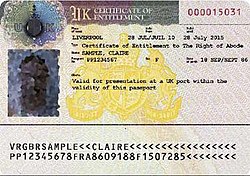
The right of abode (ROA) is an immigration status in the United Kingdom that gives a person the unrestricted right to enter and live in the UK.[1] It was introduced by the Immigration Act 1971 which went into effect on 1 January 1973. This status is held by British citizens, certain British subjects, as well as certain Commonwealth citizens with specific connections to the UK before 1983. Since 1983, it is not possible for a person to acquire this status without being a British citizen.
The right of abode is the most common immigration status in the UK due to its association with British citizenship. However, it should not be confused with the indefinite leave to remain (ILR), another form of long-term residency status in the UK which is more comparable to other countries' permanent residence status.
- ^ "Prove you have right of abode in the UK". Gov.uk. Retrieved 16 November 2018.
